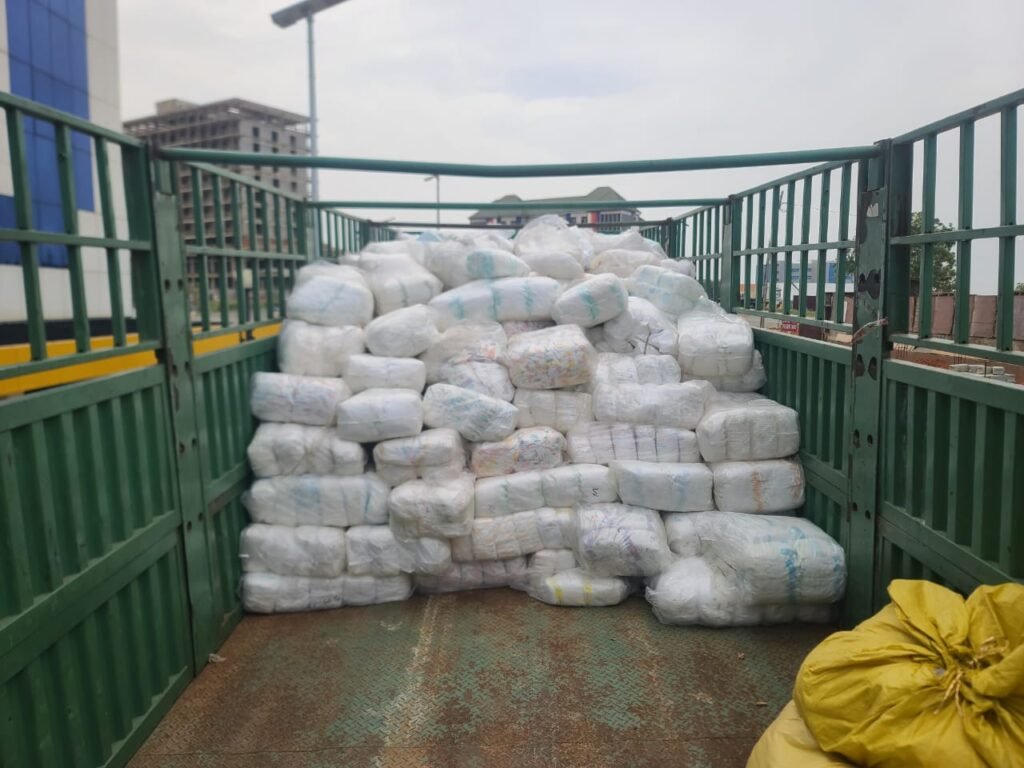In a determined and ongoing campaign to uphold public safety and protect consumer rights, the Food and Drugs Authority (FDA) of Ghana has undertaken decisive enforcement action against counterfeit and substandard diapers infiltrating the local market.
This reflects a broader government commitment to eradicating unsafe hygiene products and ensuring that only quality-assured goods are accessible to the Ghanaian public.
Following the confiscation of two containers holding over one million fake diapers—identified as posing serious health risks to infants and unsuspecting families—the FDA oversaw their destruction through controlled incineration in Ashaiman on Thursday, April 17, 2025.
This act was not only symbolic, but a substantive measure to eliminate hazardous products from circulation, reinforce regulatory standards, and deter future violations.
Of growing concern is the influx of substandard diapers imported from abroad, particularly China. In March 2025, China’s official broadcaster CCTV, during its nationally televised “3.15” Consumer Rights Day investigation, exposed a disturbing trend: unscrupulous manufacturers collecting and reprocessing used diapers and sanitary pads from waste sources, turning them into counterfeit hygiene products.

(https://www.scmp.com/video/china/3302862/chinas-annual-315-gala-uncovers-illegal-supply-chain-sanitary-pads-made-waste) These items—after being rejected by Chinese regulatory authorities—were subsequently offloaded into African markets, including Ghana, under false pretenses and at deeply discounted prices. This reprehensible and exploitative practice has drawn outrage and prompted swift response from Ghanaian health regulators.
The FDA views such actions as an intolerable assault on public health and is intensifying border inspections, market surveillance, and regulatory enforcement to prevent such products from ever reaching Ghanaian consumers.
In tandem, the Authority continues to engage with Customs, law enforcement, and international regulatory bodies to identify supply routes, dismantle illicit trade networks, and hold perpetrators accountable.
Fake diapers, typically made from inferior and unsafe materials, pose severe risks to infants—including skin irritations, infections, and long-term discomfort. The FDA’s stance is unequivocal: no child should suffer harm from negligence or commercial greed.
Accordingly, the Authority has scaled up laboratory testing protocols, increased frequency of retail inspections, and launched community-level education campaigns to raise awareness on identifying authentic hygiene products.
Consumers are strongly urged to purchase baby care products only from authorized and reputable vendors. Telltale signs of counterfeit diapers include inconsistent packaging, lack of regulatory labels, poor absorbency, and suspicious brand names.
The public is encouraged to report any such suspicious goods directly to the FDA via its official hotlines or website.
This operation marks yet another chapter in the FDA’s ongoing commitment to regulatory vigilance and public welfare.
It underscores the government’s zero-tolerance policy toward counterfeit health products and reaffirms that the safety, dignity, and well-being of Ghana’s youngest citizens remain a top national priority.








